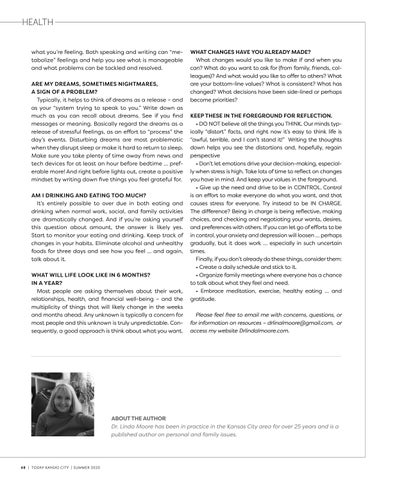HEALTH what you’re feeling. Both speaking and writing can “metabolize” feelings and help you see what is manageable and what problems can be tackled and resolved. ARE MY DREAMS, SOMETIMES NIGHTMARES, A SIGN OF A PROBLEM? Typically, it helps to think of dreams as a release – and as your “system trying to speak to you.” Write down as much as you can recall about dreams. See if you find messages or meaning. Basically regard the dreams as a release of stressful feelings, as an effort to “process” the day’s events. Disturbing dreams are most problematic when they disrupt sleep or make it hard to return to sleep. Make sure you take plenty of time away from news and tech devices for at least an hour before bedtime … preferable more! And right before lights out, create a positive mindset by writing down five things you feel grateful for. AM I DRINKING AND EATING TOO MUCH? It’s entirely possible to over due in both eating and drinking when normal work, social, and family activities are dramatically changed. And if you’re asking yourself this question about amount, the answer is likely yes. Start to monitor your eating and drinking. Keep track of changes in your habits. Eliminate alcohol and unhealthy foods for three days and see how you feel … and again, talk about it. WHAT WILL LIFE LOOK LIKE IN 6 MONTHS? IN A YEAR? Most people are asking themselves about their work, relationships, health, and financial well-being – and the multiplicity of things that will likely change in the weeks and months ahead. Any unknown is typically a concern for most people and this unknown is truly unpredictable. Consequently, a good approach is think about what you want.
WHAT CHANGES HAVE YOU ALREADY MADE? What changes would you like to make if and when you can? What do you want to ask for (from family, friends, colleagues)? And what would you like to offer to others? What are your bottom-line values? What is consistent? What has changed? What decisions have been side-lined or perhaps become priorities? KEEP THESE IN THE FOREGROUND FOR REFLECTION. • DO NOT believe all the things you THINK. Our minds typically “distort” facts, and right now it’s easy to think life is “awful, terrible, and I can’t stand it!” Writing the thoughts down helps you see the distortions and, hopefully, regain perspective • Don’t let emotions drive your decision-making, especially when stress is high. Take lots of time to reflect on changes you have in mind. And keep your values in the foreground. • Give up the need and drive to be in CONTROL. Control is an effort to make everyone do what you want, and that causes stress for everyone. Try instead to be IN CHARGE. The difference? Being in charge is being reflective, making choices, and checking and negotiating your wants, desires, and preferences with others. If you can let go of efforts to be in control, your anxiety and depression will loosen … perhaps gradually, but it does work … especially in such uncertain times. Finally, if you don’t already do these things, consider them: • Create a daily schedule and stick to it. • Organize family meetings where everyone has a chance to talk about what they feel and need. • Embrace meditation, exercise, healthy eating … and gratitude. Please feel free to email me with concerns, questions, or for information on resources – drlinalmoore@gmail.com, or access my website Drlindalmoore.com.
ABOUT THE AUTHOR Dr. Linda Moore has been in practice in the Kansas City area for over 25 years and is a published author on personal and family issues.
68 | TODAY KANSAS CITY | SUMMER 2020







